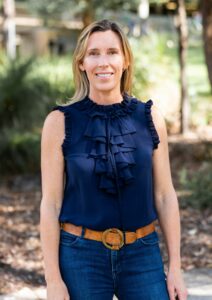Cancer Council Queensland is excited to welcome our Viertel Cancer Research Centre’s new Director of Research, Professor Sandi Hayes. With over two decades of experience in cancer survivorship epidemiology and exercise oncology science, Sandi is determined to improve the lives of those diagnosed with cancer. We sat down with Sandi to talk about her passion for translating cancer research into better patient outcomes.
What was your inspiration for working in the cancer research sphere?
While I was completing my exercise science degree, the relationship between exercise and cardiac disease was becoming more and more well understood. I had a family history of cancer and therefore didn’t fear talking about it or looking into it. So, I started looking at what we knew about the role of physical activity in cancer prevention and recovery and quickly realised there were major gaps in the evidence base. I thought, if it makes sense to integrate exercise post-cardiac disease, surely it makes sense to integrate it post-cancer. This thought opened the door to all that has followed.
What drew you to Cancer Council Queensland?
A big driver for bringing my research to Cancer Council Queensland’s existing program of research is that it made sense. My research, mission and values are completely aligned with Cancer Council Queensland’s strategy and the existing Viertel Cancer Research Program. Importantly though, I recognise that research alone rarely creates meaningful impact; instead, it requires all relevant parties that will be influenced by change to work together to ensure that what we learn in research holds true when rolled out in the real world. Cancer Council Queensland brings all those relevant ‘stakeholders’ together.
My research is completely focused on improving health outcomes for people with cancer. Every bit of research that I’m involved with must have that remit. I won’t say yes to it unless I think the results from that study could improve people’s lives in a tangible way.
When you look at your career so far, what are you most proud of?

There is lots to feel proud about. There are the small things, like hearing a participant tell us how much being part of a study helped them during their cancer journey.
Then there are more measurable achievements, such as reaching our recruitment target of 500 women for the ECHO clinical trial. This is a massive achievement for clinical trials in general, but to have achieved this in an exercise trial that involves people diagnosed with a less common and understudied cancer makes it all the more special.
More broadly speaking, I’m proud of what I’ve achieved in my wider field of research. When I first started my research career, people were told to rest or to avoid exercise until ‘they were better’. Over the past 20+ years, there has been consistent and convincing evidence demonstrating the reverse is true – adopting a higher level of physical activity during and following cancer treatment is associated with reduced treatment-related morbidity, better physical function, improved quality of life – and it may just improve survival as well. Now the trick is to work out how we can best get people with cancer active and keep them active.
Visit our Executive Team page to learn more about Sandi and other members of our executive team.

